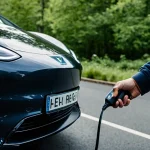Key Consumer Trends Shaping the UK Car Market
The UK car market is undergoing significant transformations driven by evolving consumer trends and changing automotive preferences. One of the most notable shifts is the rising demand for electric vehicles (EVs) and hybrid cars. This surge reflects growing consumer awareness about environmental issues and a desire to reduce carbon footprints. Buyers are increasingly prioritising eco-friendly vehicles, influencing car manufacturers to expand their EV and hybrid offerings.
Sustainability has become central to car buying behaviour. Many consumers now consider the environmental impact of their vehicle choice, looking beyond traditional factors like price and performance. The emphasis on green credentials also aligns with government initiatives promoting cleaner transport options.
In the same genre : What strategies are UK car manufacturers using to enhance vehicle connectivity?
Alongside environmental concerns, there has been a marked shift in consumer priorities. Practicality, connectivity, and advanced safety features are gaining prominence. Buyers seek vehicles that cater to modern lifestyles, offering integration with digital devices and supporting diverse mobility needs. These changing preferences highlight a move away from purely performance-focused decisions toward holistic evaluations of vehicle utility and sustainability.
In summary, the interplay between the rising adoption of electric and hybrid cars, the importance of sustainability, and evolving consumer priorities are key drivers shaping the future landscape of the UK car market.
Also read : What Are the Most Common Problems Faced by Electric Vehicle Owners?
Impact of Digitalisation on Car Buying Habits
Digitalisation has profoundly transformed car buying behavior in the UK car market, reshaping how consumers explore and purchase vehicles. One of the most significant trends is the rise of digital car sales, where customers increasingly turn to online platforms to research, compare, and buy cars. Virtual showrooms now allow buyers to experience vehicle features remotely, often through immersive 3D tours or interactive configurators, enhancing the purchasing process without the need for physical visits.
The growing preference for online car buying reflects a shift in consumer expectations. Buyers demand seamless, transparent, and convenient digital experiences. Enhanced websites and mobile apps provide comprehensive vehicle information, financing options, and customer support in real time. This digital interaction caters to a consumer base accustomed to instant access, aligning with broader e-commerce practices.
Another critical aspect is the adoption of contactless and remote car purchase processes. The COVID-19 pandemic expedited this trend, as shoppers sought safe and efficient ways to complete transactions. Contactless handovers, remote documentation signing, and home delivery services are now common, streamlining the purchase journey. This shift not only meets evolving consumer needs but also enables car dealerships to expand their reach nationally.
In summary, the integration of digital tools and platforms has revolutionised car buying, driving greater accessibility and convenience. These developments in automotive e-commerce and virtual showroom experiences reflect a pivotal change in the UK car market, directly influencing consumer behavior and expectations.
Influence of Post-Pandemic Lifestyle Changes
Understanding shifts in UK mobility and car ownership behaviour
The post-pandemic trends UK have significantly influenced car ownership and mobility habits, reshaping the UK car market landscape. One prominent change is the accelerated shift from reliance on public transport toward increased private vehicle use. As public health concerns persist, many consumers prefer the safety and convenience of personal cars, which directly alters car buying behavior and boosts demand in the private ownership segment.
Another major factor is the widespread adoption of remote working. Flexible work arrangements have transformed daily commuting patterns. With fewer days spent travelling to a workplace, consumers reassess their vehicle needs, often favouring models that suit occasional rather than daily use. This shift influences automotive preferences by elevating the importance of comfort, connectivity, and fuel efficiency, alongside sustainability considerations already prominent in the market.
Additionally, there is a growing interest in diverse personal mobility solutions beyond traditional cars. Consumers explore options such as electric bikes, scooters, and car-sharing schemes to complement or replace car usage for shorter trips. These new mobility habits reflect a broader trend towards flexible and integrated transportation options, underscoring the evolving priorities shaping UK automotive demand.
In essence, the post-pandemic trends UK have triggered a realignment in car ownership and mobility, prompting consumers to refine their preferences and purchase decisions in a landscape defined by health, convenience, and flexibility.
Market Response and Automotive Industry Adaptation
Explore how industry players meet evolving UK car market demands
The automotive manufacturing UK sector has rapidly responded to shifting consumer trends by significantly expanding the range of electric vehicles (EVs) and hybrid models. Recognising the growing car buying behavior emphasis on sustainability, manufacturers prioritise green technologies and eco-friendly materials. This shift aligns with consumer preferences for low-emission vehicles, driving a surge in new model introductions designed to meet stringent environmental standards and regulatory requirements.
To support this transformation, manufacturers have adapted their supply chains, incorporating more sustainable sourcing and optimising production processes to reduce waste and carbon footprints. These strategic changes reflect a proactive market response to fluctuations in demand and the rising importance of sustainable mobility solutions within the UK car market.
Moreover, industry innovation includes the development of flexible finance and leasing options tailored to evolving consumer purchasing habits. By offering diverse ownership models, manufacturers and dealers accommodate various budgets, lifestyles, and preferences, lowering barriers to entry for electric and hybrid cars. These financial innovations enhance accessibility, encouraging broader adoption of eco-conscious vehicles in line with automotive preferences prioritising sustainability and convenience.
In summary, the industry’s adaptive strategies—ranging from product innovation to supply chain management and consumer financing—demonstrate a concerted effort to align with contemporary car buying behavior and cement the UK’s role as a leader in sustainable automotive manufacturing.
Data-Driven Insights and Expert Perspectives
Delving into the numbers behind consumer shifts in the UK car market
Recent car market data UK provide clear evidence of the evolving landscape shaped by consumer trends and technological progress. For instance, consumer survey results show a steady rise in preference for electric vehicles (EVs), with over 40% of new car buyers in the UK expressing interest in either EVs or hybrids. This significant figure underscores how environmental concerns and government policies drive car buying behavior.
Market statistics also reveal that digital platforms are transforming purchase processes: around 30% of car transactions in recent years occur via online car buying methods, reflecting the impact of automotive e-commerce on consumer habits. The increase in virtual showroom visits has enabled buyers to compare models easily and make informed decisions. Data suggest that this digital engagement correlates with higher customer satisfaction and shorter decision times.
Insights from automotive industry experts further clarify these patterns. Experts highlight that the demand shift towards sustainable vehicles is not only driven by environmental motivations but also by enhanced government incentives and innovation in vehicle technology. Industry analyses show a parallel trend where flexible financing options and leasing models support broader accessibility for a diverse customer base, adapting to new car buying behavior and automotive preferences.
Case studies offer practical examples of these trends in action. One notable case revealed how dealerships integrating virtual reality experiences and seamless online transactions saw a 20% increase in sales within a year. These findings confirm the growing importance of data-driven, customer-centric approaches in successfully navigating the UK car market’s changing dynamics.
Together, car market data UK, consumer surveys, and expert perspectives provide a comprehensive and quantified understanding of how the UK car market is evolving. These insights form a valuable resource for manufacturers, dealers, and policymakers aiming to align with contemporary automotive preferences and consumer trends.



